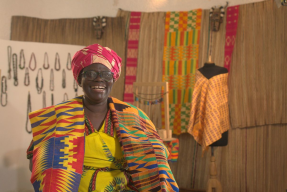
Veronica was more than just the small provisions shop owner across the street from where I used to live in Ghana’s capital city of Accra. She was more than just a woman full of life and smiles who I would often visit with on my way home from work. She was a friend, one I even visited at home to say goodbye to when I left. So when I spend my first five days in Ghana back in the neighborhood where I lived for two months last year while working at a popular Ghanaian newspaper, one of the things on my to-do list was to see Veronica.
I walked down the street where I used to live, down the entire neighborhood spanning about six blocks that I called home. The salon that a good friend of mine owns is the same, but many of the faces inside have changed. The pharmacy I frequented after falling over a random step in Ghana (which left permanent scarring) has been remodeled and my confidante Alex who used to work there has moved away. Further down, many of the same families and shops look almost exactly the same—the way I realize that I wanted them to look, which is funny considering I came here to help effect change. Other things changed drastically, such as the former trash pile that has now become a taxi station. And then there was what used to be Veronica’s shop, missing from the mix as if it had never been there in the first place. When her shop closed down, she left as well, where to I may never know.
Apparently Veronica had taken out a loan but was unable to pay back for some reason. I don’t know the specifics of what happened, but I was told that she had made some bad business decisions and got herself in over her head in debt and was unable to handle it. It was hard for me to hear considering the reason I came back here and chose to work in microfinance was to make a difference in the issue that for me was the greatest difference between people here and people back home—lack of resources. I hate seeing the economic divide that sometimes fills the air while walking down a busy street. I can see it in the eyes of those who pass me. I can hear it when children ask obruni to give them money (Obruni means foreigner but is often used to say white foreigner, which is obruni co-co). I can feel it when I receive compliment after compliment on my slippers (flip-flops) even though they are just like theirs but with a Nike swoosh. The fact is that people in Ghana can’t readily access resources the way people in the United States can. You want a house but can’t afford it, so you take out a loan. If people in Ghana want a house but can’t afford it, they save up until they can and then start building until they run out of money. Then they save up some more and keep working on the house. There aren’t nearly as many scholarships or educational opportunities, and even if they get an education, the Ghanaian people say there’s no place to go with it. There are a lack of jobs, and even a good job at a bank pays about $350 per month—not bad money for Ghana, but how can people compete and take care of a family in a global economy—imagine saving up to go on a cruise if you only earn $350 each month and have a family to take care of; it is simply not an option
I think about my life and about how hard I have worked for everything I have, be it the clothes on my back or the laptop that I am typing on. I feel as if I deserve these things because I worked so hard to attain them. But then I look around me in the office I share with Ghanaians—who earn about $210 each month– and wonder what my life would be like had I been born Ghanaian. What if, no matter my profession, I never had the opportunity to earn a comfortable lifestyle. It is a scary thought for me growing up as an American where I consider my college years and post-college years of constant lack of money the character builder that I will remember throughout the rest of my life when I do have money. It is a means to an end, but people in Ghana never have that comfortable end in sight. Some do, of course, but it is a much smaller pecentage than those that reach such a place in the United States and with much less stuff. The family that I am living with here in Ghana is relatively well off. They have a big house, running water, a toilet, a television even—but you can’t help but to notice that the walls are empty. I think of my own house covered with photos, knick-knacks, and the like. Money only goes so far in Ghana, and photos are a luxury item. With a 4 by 6 costing the equivalent of $1, such items are scarce here.
It reminds me that nothing in this life is promised—that picture-perfect future that I still hope will happen is not certain. Because even if I work really hard to make it happen, the same thing that happened to Veronica could happen to me. I could fall on my face, and no one may be there to help pick me up. I think maybe hearing about Veronica should have depressed me, but it made me want to work harder. I want to make it so that people have a place to access resources, so that when the economy deflates or when a crisis occurs people can take care of themselves through it.
The goal of Kiva is to alleviate poverty by enabling and empowering the poorer people in the world to pull themselves out of poverty in order to create a sustainable and better life for themselves. My goal is to do the same but on a more micro-level. I can only do so much here at Christian Rural Aid Network, but if I successfully do so along with the other Kiva Fellows, then I believe we can do so much. Maybe I have to have this faith because otherwise how will I ever be doing what I am doing.
I end this first fellows blog with my favorite quotes by one of my very favorite authors, Arundhati Roy, because it is everything I am thinking about as I am about to finish my third day of work.
“To love. To be loved. To never forget your own insignificance. To never get used to the unspeakable violence and the vulgar disparity of life around you. To seek joy in the saddest places. To pursue beauty in its lair. To never simplify what is complicated or complicate what is simple. To respect strength, never power. Above all, to watch. To try and understand. To never look away. And never, never, to forget….another world is not only possible, it is on her way and, on a quiet day, if you listen very carefully, you can hear her breathe…Either way, change will come. It could be bloody, or it could be beautiful. It depends on us.”
/>PREVIOUS ARTICLE
Tupac, Akon and Sierra Leone →NEXT ARTICLE
"Who'd have thought kiva.org would out last Lehman brothers?" →













